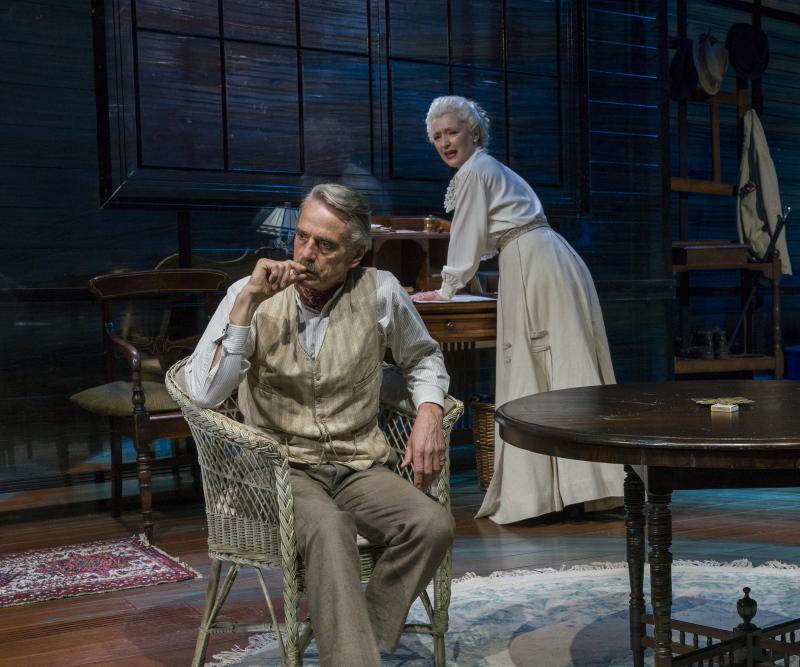Review: Jeremy Irons and Lesley Manville Star in Eugene O'Neill's LONG DAY'S JOURNEY INTO NIGHT
|
Ranking up there with MEDEA and OEDIPUS REX, Eugene O'Neill's family tragedy LONG DAY'S JOURNEY INTO NIGHT would most likely make any playgoer's list of inappropriate classics to revive on Mother's Day weekend.

(Photo: Richard Termine)
Written in the early 1940s and heavily autobiographical in its details, O'Neill had sealed copies of the manuscript locked up by both Random House and Yale University with orders that it not be published nor performed for the public until 25 years after his death. But the playwright's widow had other ideas and three years after his passing, LONG DAYS JOURNEY INTO NIGHT opened on Broadway in November of 1956 (after a premiere engagement in Stockholm), winning the Best Play Tony Award and the Pulitzer Prize for Drama.
The setting is August of 1912 in the Connecticut summer home of the Tyrones, all of whom bear first names identical to those of O'Neill's family.
Patriarch James Tyrone was once a handsome matinee idol actor who earned a tidy sum giving thousands of performances of a sweeping romantic adventure. He was so popular in the role that the public didn't care to see him in anything else. Now retired from the stage, he loses himself in alcohol to forget the pain of his career's wasted potential, a situation that parallels the experience of James O'Neill, who was so popular starring in THE COUNT OF MONTE CRISTO that he was a flop whenever he tried stretching to other roles.
James Tyrone's wife, Mary, like O'Neill's mother, gave birth to three sons, with both middle children dying of measles. In real life Eugene O'Neill was the youngest and middle brother Edmund didn't survive, but the playwright switches the identities of the two. The fictional Mary blames eldest son, James Tyrone, Jr. for Eugene's death, believing that, at age seven, he intentionally gave his two-year-old brother his measles.
But the key similarity that drives the play is that both mothers, the fictional Mary and the real-life one, became addicted to the morphine her doctor prescribed after the difficult birth of her third child. Mary's resentment towards Edmund reflects what Eugene O'Neill felt coming at him from his own mother.
The four-act piece takes us from morning to afternoon, evening and midnight on a typical day for the Tyrones after Mary's return from addiction treatment; a time full of regret, animosity and heavy drinking. What makes this one different is news of a doctor's confirmation that Edmund is stricken with consumption and requires six months to a year in a sanatorium for recovery, a situation taken from the playwright's own sanatorium stay that same year.
.jpg)
(Photo: Richard Termine)
In one sense, time away from the family would be a welcome respite, but the thrifty father wants to settle for the cheapest option for his son's recovery.
Arriving perhaps a bit too soon on the heels of director Jonathan Kent's superb 2016 Broadway production, which featured a spectacularly unsettling performance by Jessica Lange, Sir Richard Eyre's Bristol Old Vic mounting, which is visiting BAM's Harvey Theater for a short run, may seem rather standard by comparison, though it's nevertheless a nicely presented, well-acted effort.
Set and costume designer Rob Howell dresses the actors in realistic period garb but places them in an imposing abode made of transparent walls; the presence of a picture window and of a skylight above reinforcing the symbolism. It's a reminder of the family's celebrity, however diminished at this point, that watches their every move.
Jeremy Irons plays James Tyrone with the kind of spunk and elevated charm that suggests a man who envisions himself in the spotlight throughout his everyday life. He makes such fanfare out of his admiration of his wife's progress in kicking her addiction that you'd think he was showing off to the press instead of sincerely offering support.
But this is a man who appears to only express sincerity when angrily triggered by his eldest son's lack of achievement and when alcohol brings on bouts with his personal regrets.
Rory Keenan's James Tyrone, Jr. is particularly strident in expressing his cynicism with the kind of dramatic flair that he apparently acquired from dad, suggesting he might have had a successful stage career if excessive drinking and womanizing didn't sour his reputation.
As the stand-in for the playwright, an actor might play Edmund with hints of the character looking back at that long day, but Matthew Beard's portrayal is very much of the moment in its introverted reactions to the imbalanced family dynamic before him.
Perhaps the production could have a greater impact if Lesley Manville's depiction of Mary Tyrone's relapse wasn't played with such child-like vulnerability. It's certainly a legitimate choice to emphasize her feelings of helplessness with a delicate touch, but the tragedy could use some darker hues.
Jessica Regan gives a fine comical turn in her small role as the maid Cathleen, who isn't above imbibing an extra shot or two of her employer's liquor when the lonely Mary seeks her company. Spending a summer in this tension convention, who can blame her.
Videos
